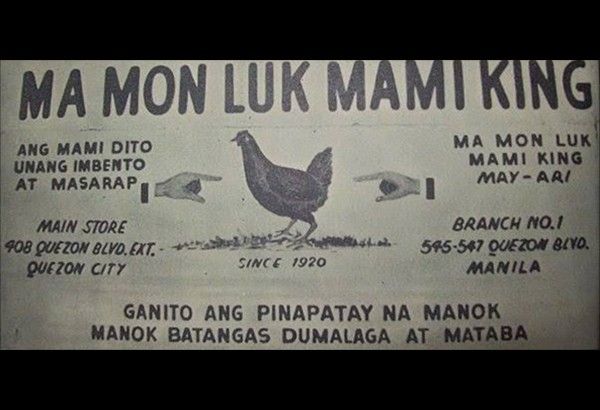Ma Mon Luk: Still home of the best-value mami and siopao

MANILA, Philippines - We Filipinos love to eat. As a food-loving nation, we have cultivated an enormous variety of staples, viands, desserts, dishes and regional, seasonal specialties. But when it comes to mami (chicken noodles) and siopao (steamed buns), only one name immediately comes to mind – Ma Mon Luk. For the most part of the 20th century, the iconic noodle house in Quiapo has been home to the finest mami and siopao. An enduring historical landmark and foodie haven, Ma Mon Luk has become synonymous with good food and best value for money.
The historic brand is actually a person’s name. Born and raised in Guangdong, China, Ma Mon Luk was a grade school teacher who migrated to the Philippines in 1920. Arriving without money and employment, he relied on the one thing he knew best, making delicious chicken noodle soup. Plying the streets by day, Ma Mon Luk’s hard work and entrepreneurial skills became the backbone of his fledgling business.
Mr. Ma’s miki
Much like today’s magtataho, he became a familiar sight in Manila, walking the streets, a long bamboo pole slung on his shoulders with two metal containers at each end of the pole. He would be seen daily, cutting noodles with scissors before topping strips of chicken meat in steaming broth. Most of his patrons were college students looking for hot, filling and affordable fare. It is even theorized that the word mami may have come from his name Ma and mi-ki, Chinese word for egg noodles.
After saving enough money to rent his own place, he opened his first restaurant in Binondo, where the equally famous siopao and steamed pork dumplings (siomai) were born. Still, he continued walking the streets as an ambulant vendor to advertise his goods and promote the restaurant. Ma Mon Luk and his noodles gained wide recognition and he opened another branch in Banawe, Quezon City (along Quezon Avenue).
Still the original recipe
In 1961, Ma Mon Luk died from throat cancer, but his business flourished and is now managed by the third generation of his family. A long time has passed since. Despite all the years and changes the country has gone through, this iconic restaurant remains true to the original recipe.
The main branch at Quiapo is still bristling with activity. It is indeed old, as if stuck in the 1950s. The wooden interior evokes a homey, antique feel. The white tables and brown, wooden chairs are very much occupied. Rustic ceiling fans still blow a gentle breeze. The walls are packed with framed pictures and vintage newspaper clippings. And the door? As open as ever. Partly hidden from view from the busy street by numerous street vendors, the old white sign is easy to miss, but the sight of diners happily eating will convince anybody to enter and take a seat.
Simple menu, same great taste
A simple fiberglass sign lists just seven items on the menu. But the taste of each is more than enough to evoke a sense of good, old days, of childhood memories gone by. The recipe that was handed down through generations is still the one being enjoyed today.
The Special Mami (P120) is a large bowl filled with swirls of fresh egg noodles topped by delicious pork slices in steaming pork broth, sprinkled with fried garlic bits and green onion leeks. Meanwhile, the Beef Mami (P130) is a bowl with generous servings of fresh egg noodles swimming in hot and flavorful beef stew, topped by tangy, tasty beef slices and sprinkled with fried garlic bits and green onion leeks. The large, soft and white Special Siopao (P70) and Sang Yuk Pao (P70) are both meaty and very filling. It is stuffed with delectable, soft, shredded meat and chunk of salted egg. A two-piece serving of tasty Pork Siomai (P50) is enough to remind anyone why this particular noodle place has managed to carve an irreplaceable place in the heart and stomach of Filipinos.
The past is filled with simpler, less stressful and more colorful days. Yearning to taste it again? Have a bowl of mami and a serving of siopao.
R. Ma Mon Luk Restaurant is located at 545 Quezon Blvd., Quiapo, Manila (733-7596) and 408 Quezon Ave. cor. Banawe Ave. Quezon City. Both are open daily, from 9 a.m. to 8 p.m.



















